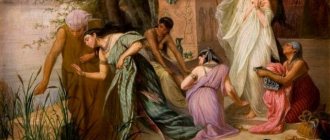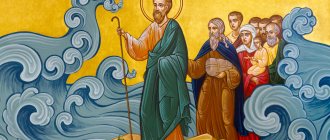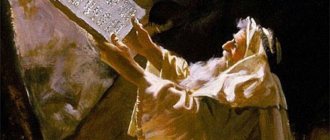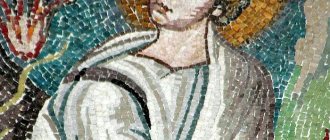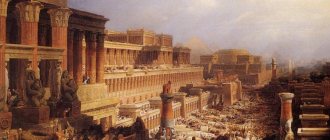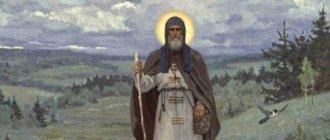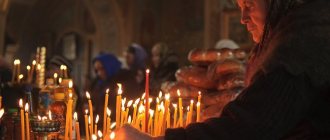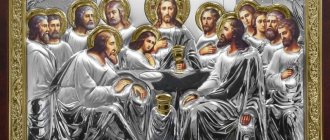Venerable Moses Ugrin
Memory 26 July / 8 August
Saint Moses labored in the 11th century. He was Hungarian by origin. Together with his brother George, he served at the court of the martyr prince Boris, who was strongly attached to him. Moses, the only one from the prince's retinue, survived after his murder. He found refuge in Kyiv, in the house of Predislava, the sister of Prince Yaroslav. While there, the saint devoted all his time to prayer.
After Yaroslav defeated Svyatopolk, he fled to Poland, but soon returned with a new army, expelled Yaroslav and occupied Kyiv. Moses was captured by King Boleslaw and taken to Poland. There, one rich noble widow, noticing the strength and beauty of the saint, bought him for 3 thousand gold and offered: “If you submit to me, I will make you great in all our land, you will own me and all my wealth.” The blessed one understood her unclean desire and answered: “Who, having taken a wife and submitted to her, kept the law? Adam submitted to his wife and was expelled from paradise. Samson surpassed everyone in strength, and after his wife was betrayed to foreigners. Solomon comprehended the depth of wisdom, and, obeying his wife, bowed to idols. Herod won many victories, but became enslaved to his wife and killed John the Baptist. How can I, who am free, make myself a slave to my wife?!” The woman answered: “You will be my husband, just let me enjoy your beauty.” To this the blessed one said to her: “I don’t want your power or your wealth. For me, the best thing is spiritual purity, as well as physical purity. I will not waste the labor of five years, which the Lord deigned me to endure in these chains. I don’t deserve such torment, so I hope to get rid of eternal torment for it.”
The widow tried to seduce him with various tricks, but Moses, like a new Joseph, resisted all temptations, tightening his fast and mortifying his flesh. Considering his resistance an insult, the woman ordered him to be thrown into prison and starved to death, but the Lord inspired one of the servants to secretly bring him food. The saint's friends persuaded him to accept the proposal and marry the widow, saying that it was wrong to disdain marriage and that the Old Testament patriarchs, even Joseph, had wives, and that only monks did not marry. The saint replied that their advice was worse than the persuasion of the serpent in paradise, because he decided to remain pure in order to devote himself entirely to the love of the Lord.
When the woman was informed about these words of Moses, she ordered him to be put on a horse and show all her estates, declaring to the peasants that this was their owner and her husband. The saint, feeling pity for the widow’s ridiculous attempts, convinced her that nothing would force him to renounce the incorruptible blessings prepared for the elect. Having secretly taken monastic vows from an Athonite monk who was passing through this country, he appeared to his mistress in monastic vestments. Enraged, the widow ordered him to be tortured and torn with metal tongs, so that the ground was covered with the blood of the martyr. To the executioner, who wanted to save him from the most cruel tortures, the saint said: “Brother, I cannot renounce my monastic vows. Neither torture, nor fire, nor sword can deprive me of the love of God and the angelic monastic order.”
The matter reached King Boleslav, who tried to convince Moses to accept the widow's proposal. Having encountered a refusal from the saint, he allowed the woman to do whatever she wanted with him, fearing that otherwise his example might persuade other servants to disobey their masters. Then the woman ordered the saint to be castrated and given a hundred blows of the whip every day. And the saint bravely endured beatings and cruel treatment for many days.
As the saint predicted, in the end God’s justice was carried out. Boleslav, who began a strong persecution of the monks, was suddenly struck down by illness and died the next night. Unrest and unrest began throughout the kingdom, the rebels killed bishops and their masters, and during these events the lady of Moses was killed.
Having received freedom after six years of trials, in which his virtues blossomed, likening him to Job and Saint Joseph, the Monk Moses was able to return to Kyiv. He entered the Pechersk Lavra and, under the guidance of Saint Anthony, spent about ten years in silence and prayer. Having reached a high degree of spiritual perfection and filled with grace, he rested on July 26, 1043. The venerable relics of the Monk Moses are kept incorrupt in the Near Caves. Over the past centuries, many Christians, through his prayers, turned away from the luxury and temptations of the flesh.
From the book “Synaxarion: Lives of the Saints of the Orthodox Church,” published by the Sretensky Monastery Publishing House.
Compiled by Hieromonk Macarius of Simonopetra, adapted Russian translation by Sretensky Monastery Publishing House
Memory of August 8
Striving more than others in the battle against fornication, blessed Father Moses suffered a lot, as a good warrior of Christ, until he completely defeated the power of the unclean enemy.
It is known about this blessed Moses that he was from Hungary, was close to the holy noble Russian prince and passion-bearer Boris, and served him with his brother George, who was killed with Saint Boris. Then, near the Alta River, George wanted to shield his master from the murderers, but the soldiers of the godless Svyatopolk cut off George’s head in order to take the golden hryvnia that Saint Boris had placed on him. Blessed Moses, having survived death alone, came to Kiev to Predislava, Yaroslav’s sister, where he hid from Svyatopolk, diligently praying to God, until the pious prince Yaroslav came, attracted by pity for the murder of his brother, and defeated the godless Svyatopolk. When Svyatopolk, who fled to the land of Lyash, came again with Boleslav and expelled Yaroslav, and sat down in Kyiv, then Boleslav, returning to his land, took with him into captivity two of Yaroslav’s sisters and many of his boyars; Among them they led the blessed Moses, bound hand and foot with heavy iron; He was strictly guarded because he was strong in body and handsome in face.
This blessed one was seen in the Lyash land by a noble woman, beautiful and young, possessing great wealth and importance; her husband, having gone on a campaign with Boleslav, did not return, but was killed in battle. She, struck by the beauty of Moses, felt the lust of carnal lust for the monk. And she began to convince him with words of flattery and the opportunity to let him go. Understanding her bad lust, the blessed one said: “Know that I will not fulfill your will; I don’t want your power or wealth; for me, spiritual and physical purity is more valuable than all this. I don’t want to waste the labor of five years, during which the Lord granted me to endure in these bonds, being innocent of such torment, for which I hope to be delivered from eternal torment.” Then the woman, seeing that she was deprived of such beauty, took another devilish decision, reasoning like this: “If I ransom him, he will submit to me unwillingly.” And she sent to the one who brought him into captivity to take from her as much as he wanted, if only he would give her Moses. He, taking advantage of the opportunity to acquire wealth, took up to a thousand gold pieces from her and handed Moses over to her. The woman, having gained power over him, shamelessly lured him into a vile deed. Having freed him from his bonds, she dressed him in expensive clothes and fed him sweet dishes and, hugging him with unclean embraces, forced him to carnal lust. Blessed Moses, seeing her fury, was even more diligent in prayer and fasting, preferring for God to eat dry bread and water in purity than in filth - expensive dishes and wine. And he took off his beautiful clothes, like Joseph once did, and escaped sin, despising the blessings of this life. The woman, disgraced, was filled with such rage that she decided to starve the blessed man to death, throwing him into prison. God, who gives food to every creature, who once nourished Elijah in the desert, also Paul of Thebes and many of His other servants who trusted in Him, did not abandon this blessed one. He bent one of the woman's slaves to mercy, and he secretly gave him food.
He said to those who admonished him: “I ask you, for whom is it appropriate to work - for the Lord or for the wife? I also know that he writes, “Slaves, listen to your masters,” but in good, not in evil; So understand, you who hold me, that female beauty will never seduce me and will not tear me away from Christ’s love.”
Hearing about this, the woman accepted another evil thought in her heart: she ordered the blessed one to be put on a horse and led around his towns and villages with many servants, saying: “All this is yours, if you please. Dispose of everything as you wish." And she gave the order: “This is your master, and my husband. When you meet him, bow to him." The blessed one, laughing at the woman’s madness, said to her: “You work in vain, you cannot seduce me with the corruptible things of this world, nor steal my imperishable wealth; understand and don’t work in vain.” The woman said to him furiously: “Or don’t you know that you have been sold to me? And whoever snatches you out of my hands; I will not let you out alive, but after many torments I will put you to death.” The blessed one boldly answered her: “I am not afraid of any trouble, because the Lord is with me, to whom from now on, by His will, I desire to work the monastic life.”
At this time, at the inspiration of God, one monk, with the rank of priest, came to blessed Moses from the Holy Mountain, and clothed him in the holy angelic monastic image; I taught him a lot about purity, so as not to yield to the enemy and not to be afraid of that nasty woman, and then he left. They looked everywhere for this monk and did not find him. Then the wife, despairing of her hope, inflicted severe wounds on the venerable monk Moses: stretching him out, she ordered to beat him with a rod, so that the ground was saturated with his blood. The executioners told him: “Submit to your mistress, do her will; if you disobey, we will break your body into pieces. Do not think of avoiding these torments, after which you will sadly betray your soul. Have mercy on yourself, throw away this monastic rags and dress in valuable boyar clothes, and you will be freed from the torment that awaits you.” Courageous Moses answered them: “Brothers, without delay, do what you are commanded. But I just cannot renounce monasticism and the love of God, and no languor - neither fire, nor sword, nor wounds - can separate me from God and from this great angelic image. To this shameless and darkened woman, who has clearly shown her shamelessness, who has offended not only the fear of God, but also the shame of man, who shamelessly forces me to defilement and adultery, I will in no way submit and fulfill her accursed will.”
The woman, preoccupied with how to avenge her shame, finally wrote the following letter to Prince Boleslav: “You yourself know that my husband was killed while fighting with you, and you gave me the freedom to take as my husband whomever I want.” . I fell in love with one of your captives, who is beautiful, and, having ransomed him, I took him to my house. I paid a lot of gold for him and gave him all the silver and gold in my house, and all the power, if only he wanted to become my husband. And he considered all this as nothing; I often tormented him with hunger and wounds, but did nothing. It didn’t seem enough to him to spend five years chained with the one who took him captive, so he spent the sixth year with me, and I tormented him a lot for disobedience, which he himself brought upon himself with his hardness of heart. And now he has been tonsured by one of the monks. What do you want me to do with him?
Prince Boleslav ordered that woman to come to him and bring Moses. When his order was fulfilled and he saw the monk, he much exhorted the monk to take that wife, but did not convince him. Finally he said to him: “Who is so insensitive as you that you deprive yourself of many benefits and honor and give yourself up to bitter torment? Know from now on that you must choose life or death: either, having fulfilled the will of your mistress, be in honor with us and have great power, or, having disobeyed, after fierce torment, accept a fierce death.” He also said to the woman: “Let the captive you bought not be free, but, as a mistress, do with your slave what you want, so that others do not dare to disobey their masters.” Our venerable father Moses answered him: “What good is it for a man, if he gains the whole world, but loses his soul; or what will a man give for his soul? That you promise me honor and glory, which you yourself will soon lose, and the coffin will accept you, having nothing; likewise this wicked wife will be killed in an evil way.”
But before that, the woman, having received even greater power over him, with shamelessness even more strongly inclined him to sin, so that she ordered him to be forcibly laid on her bed, hugged and kissed him, but even with this seduction she could not attract him to her desire. The monk said: “Your efforts are in vain, woman; Don’t think that I don’t commit this sin because I’m crazy or I can’t, but because of the fear of God and abhorring you, I’m unclean.” Having received such an answer, the woman ordered to give him a hundred blows every day, and then ordered his secret members to be cut off. The Monk Moses lay as if dead from bleeding, barely breathing.
Intervening in this matter and wanting to please the woman even more, for the sake of the greatness of her family and his disposition towards her, Boleslav instigated a great persecution against the Black Rides and expelled them all from his region. God soon avenged His servants. One night Boleslav suddenly died, and a strong rebellion occurred throughout the entire Lyash land. The people rebelled, beat up the bishops and boyars, and among them that shameless woman was killed.
Many years later, the Grand Duke of Kyiv Izyaslav was reminded of this wrath of God, which occurred after the expulsion of the Monkmen for the tonsure of the Monk Moses, by his princess, daughter of Boleslav, asking urgently not to expel the Venerable Anthony and his brethren from her region for the tonsure of the blessed Varlaam and Ephraim the eunuch. But let's turn to the present.
Our venerable father Moses, having gathered a little strength, came to the cave to the Monk Anthony, bearing the wounds of martyrdom, like a brave warrior of Christ, and lived godly, striving in fasting, prayer, vigil and all the monastic virtues, with which he conquered everything to the end the machinations of an unclean enemy.
For many victories over the prodigal passions that tempted this saint, the Lord gave him the power to help others overcome the same passions. One brother, struggling with the passion of fornication, came to the monk and begged him to help him. “I promise to observe it until death,” he said, “if you command me to do anything!” The monk told him: “Never speak a single word to a woman in your entire life.” He promised with zeal. Then the saint, imitating the first Moses, who performed miracles with his rod, touched his brother’s womb with his rod, without which he could not walk from the pain of the wounds he had previously received, and suddenly all the unclean passions in that brother’s body died, and from then on there were no more temptations for him .
This good warrior of Christ, amid suffering, reached the sixteenth year of his godly feat; innocently tormented by those who took him captive for five years, he showed the patience of Job, in the sixth year, he suffered courageously for purity more than Joseph, then with ten years of equal-angelic silence in the cave, transmitted from the holy Mount Athos, he shone before others, like the first Moses - with the ten-numbered law transmitted through Angels from the Holy Mount Sinai. And our Reverend Moses was truly honored to be a Seer of God - he turned out to be worthy of the bliss of the pure in heart. And in order to see God face to face, he moved in the month of July on the 26th day, during the life of the Monk Anthony, in whose cave the incorruptible miraculous relics of this saint, who did not corrupt the purity of his husband, lie.
Saint Moses, even after death, conquers unclean passions with his relics, as Saint John the Long-Suffering experienced. Shutting himself in a cave and digging himself up to his shoulders against the relics of the Venerable Moses, for the victory of fornication, after much suffering, he heard the voice of the Lord, telling him to pray to the Venerable Moses Ugrin, who was buried opposite him. When the Long-Suffering One fulfilled this, he was delivered from unclean warfare. Also, the same Saint John delivered another passionate brother from the same dirty trick, when he gave the one suffering from passion one bone from the relics of the Monk Moses to apply to his body, as is described in the life of the Monk John the Long-Suffering.
The relics of the Monk Moses Ugrin still rest in the Near Lavra caves, on the maps of which they have been marked since the “Teraturgima” of 1638, where the ascetic is mentioned as “St. Moses Ugrin, lover of cleanliness."
Separately, the memory of the saint is celebrated on August 8 (July 26, O.S.).
Orthodox Life
About victory in the war that we lost - Sergei Komarov.
“The unclean enemy especially wages war on a person through unclean lustful passion, so that a person, darkened by this filth, does not look to God in all his affairs, because only those who are pure in heart will see God.” With these words begins the life of the Monk Moses Ugrin, whose memory the Church honors on August 8. Indeed, Moses defeated that passion that has always, and even more so today, stood and stands at the forefront of the devil’s army of temptations. Fornication, which has toppled many great pillars, is indeed capable of hiding the face of God from a person and completely robbing a person, depriving him of his mind and will. This passion eats away the soul from the inside, leaving behind despondency, madness, insensitivity to everything spiritual, and inevitably gives rise to subsequent links of destructive passions. Complete victory over fornication, at the level of thoughts and feelings, is a rare phenomenon even in the vast world of Christian saints. It is precisely this kind of victory that we celebrate on the day of remembrance of the great saint, the Venerable Moses Ugrin.
***
Being a Hungarian by origin (Ugrin means Hungarian), Moses served in the squad of the passion-bearing prince Boris. After the murder of Boris by his brother, Svyatopolk the Accursed, Moses hid in Kyiv, and in 1018 he ended up in Poland, becoming a prisoner of King Boleslav. There a rich Polish widow fell in love with him and bought him, wanting to make him her partner. Having encountered a refusal, she came up with various means, trying in every possible way to seduce the young man. She dressed him in luxurious clothes, fed him delicious dishes, showed him the wealth of her estates, forced the servants to bow before him, and called him her husband. The king himself begged the monk to take the woman as his wife. The Polish slaves also persuaded Moses. The life contains interesting dialogues about marriage and celibacy, put into the mouths of Moses and the servants of the depraved widow.
Servants: “Does not Christ say in the Gospel: For this reason a man will leave his father and mother and be united to his wife, and the two will become one flesh (Matthew 19:5). Likewise the apostle: It is better to marry than to become inflamed (1 Cor. 7:9). He also speaks about widows: I want young widows to marry (1 Tim. 5:14)... Who abhorred the women of the first righteous people, like Abraham, Isaac and Jacob?.. Joseph first fled from the woman, but then he took a wife.”
Moses: “If many righteous people have been saved with their wives, I alone am a sinner and cannot be saved with my wife. But, if Joseph had listened to Potiphar’s wife before, he would not have reigned later when he took a wife for himself in Egypt (Gen. 39 and 41). God, seeing his previous patience, gave him the kingdom of Egypt, which is why he is glorified in his generation for his chastity, although he had children. I do not desire the kingdom of Egypt, and not to dominate the authorities... but I despised all this for the sake of the kingdom above. Therefore, if I leave the hands of this woman alive, I will never look for another wife, but, with God’s help, I will become a monk. For what did Christ say in the Gospel? Everyone who leaves house or brothers or sisters or father or mother or wife or children or lands for My name’s sake will receive a hundredfold and will inherit eternal life (Matthew 19:29). Should I listen more to you or to Christ? The Apostle says: The unmarried man is concerned about the things of the Lord, how to please the Lord, but the married man is concerned about the things of the world, how to please his wife (1 Cor. 7:32-33). I will ask you, for whom is it appropriate to work - for the Lord or for the wife? I also know what he writes: Slaves, listen to your masters, but in good, not in evil; So understand, you who hold me, that female beauty will never seduce me and will not tear me away from Christ’s love.”
This confrontation ended with the Athonite hieromonk passing through Poland tonsuring Moses into monasticism. The woman, having learned about this, became furious and ordered the sufferer to be tied to the bed, intending to rape him. But even when she began to caress him, he, with his prayer and incredible effort of will, forced his body to be completely dead to sin. Then the noblewoman ordered to stretch the monk and give him a hundred blows with sticks every day, and then ordered him to be castrated. Soon a rebellion broke out in Poland, the evil widow was killed, and Moses, who miraculously survived, suffering from severe wounds, came to the Kiev Pechersk Monastery. There he lived for another ten years. For his great victory, the Lord gave him the power to help other people overcome the passion of fornication. So, one brother, tormented by lust, came to the monk for help. “I promise to observe until death everything that you command me,” he said. Moses said, “Never speak a single word to a woman in your entire life.” Brother promised. Then the monk, like the biblical Moses, who performed great miracles with his rod, touched the monk’s chest with his cane - and he was immediately healed. Moses did not lose God's gift of helping others even after death. The Life of John the Long-Suffering describes how Saint John, struggling with fornication, buried himself up to his shoulders in a cave, opposite the relics of the Monk Moses. But even then lust did not leave him. John received healing only after the Lord told him to pray to the dead man lying in front of him. Subsequently, John himself freed another monk from the same passion, commanding him to apply the bone of Moses Ugrin to his body.
The relics of St. Moses Ugrin in the Near Caves of the Kiev Pechersk Lavra
***
The life of Moses is amazing not only for the courage of the monk, the strength of his patience and faith. It is striking in its very precedent. A young, handsome man, not even being a monk, refuses, in order to preserve his virginity, everything that millions of people seek as the greatest happiness: wealth, power, an advantageous marriage with a luxurious woman. And not only refuses, but also suffers terrible torment. As we see, not only the widow and her servants, but also the king himself could not understand his choice. Give up something that many can only dream of!
I once retold life to teenagers in Sunday school. I spoke and felt that they did not understand. Of course, it is worth making allowances for age - children are not able to understand everything. But nevertheless, a huge semantic gap was obvious between what our children are taught at school and on the street, and what they hear in the Church. There, behind the temple walls, there is an ideology called “Take everything from life.” Here: “Give up the visible for the invisible.” School and street - six days a week, Church - a couple of hours a week. Whose image will win in their life? Moisey Ugrin or Selena Gomez? Don't know. God knows.
What about children! We, believing adults, are ourselves imbued with the hedonistic philosophy of the world and often act according to its wolfish laws. In a world of feelings and thoughts closed from other people, an internal choice “not for the sake of Jesus, but for the sake of a bite of bread” can occur daily, hourly. You may not have big money, but dream about it; to be far from power, but to desire it; to be a respectable family man, but at the same time carry a red-hot volcano of lust inside of you. And a war lost inside, under the necessary circumstances, can easily move into the outside world and end up in the next report of a criminal chronicle.
Who is not sick with fornication, in thoughts or secret desires? Who hasn't been touched by the clawed paw of this monster? Monk or layman, priest or simple Christian, man or woman, teenager or pensioner - who does not experience the attack of a dangerous passion that parasitizes the laws of nature? And who is completely indifferent to a banknote? Who wouldn't like to boss someone around? The Monk Moses Ugrin, whose relics rest in the Near Caves of the Kiev Lavra, awaits all of us, monastics and laymen, priests and ordinary parishioners, equally infected with all the diseases of this century, for repentance, promising immediate help.
There is a unique place in the caves for all fornicators - the space between the relics of the Monks Moses Ugrin and John the Long-Suffering. Often there you can see a woman crying bitterly or a gloomy-looking man with his head bowed. And every believer, passing by the saints of God, will kneel and pray for cleansing of the mind and heart and protection from the demon of fornication. In the shrine containing the relics of St. John there is a small hole from which emanates the sweet fragrance of the holy relics. It is noticeable only if you kneel down. They say that a person who has fallen into actual fornication will not feel the smell. Perhaps the Lord arranged it this way to remind the sinner, who has sunk to the very bottom of fornication, of repentance and the undoubted prayerful intercession of those who completely defeated fornication during their lifetime.
***
The writer of the life of the Monk Moses counts sixteen years of his feat and connects each period with the name of the biblical saint. During the five years of captivity, the monk showed Job’s patience. In the sixth year he suffered for his purity, like Joseph. In ten years of silence in the cave, he shone like the first Moses, who brought the Ten Commandments to Israel, and was also honored to be a seer of God, because it is said: “Blessed are the pure in heart, for they will see God” (Matthew 5:8). If we continue such comparisons, we will come to identify the Kyiv Lavra and Kyiv with Russian Jerusalem and will not come up with anything new, because many said this long before us.
Such associations will clearly be an accusation towards those who live near the walls of the most ancient monastery in Rus' or have the opportunity to reach it within a few hours, but neglect this gift of God. The Divine Lavra calls to its shrines from afar - with the ringing of bells, the radiance of domes, countless books and films dedicated to it. There are still many who live near the Kyiv hills, but while they hear, they don’t hear and, while they see, they don’t see. Lavra prays for them and waits.
The Monks Anthony and Theodosius, Saint Agapit, the incomprehensible Mark the Grave Digger, the formidable Ilya of Muromets, the terrible for demons St. Isaac the Recluse and a great many other saints of God are waiting, ready to listen and prayerfully help. The underground cell of the Near Caves also awaits us, in the blessed silence of which rest the relics of an amazing ascetic who showed us a great example of love for God, for virginity, for monasticism. The holiness of the saint calls us to his tomb to cry, to pray, to ask. Let us come to him - and the fervent prayer of Moses will pick up our weak sighs and lift them high, high, to the throne of God. Let us come so that we too can take something from his fire. Let us come to learn to believe, endure, hope, love, and keep ourselves from the lusts of the world. Let us come to understand the significance and greatness of those shrines next to which we live. Let us come there to say: “Reverend Father Moses, pray to God for us!”
Sergey Komarov
New in blogs
Sergey Komarov
Reverend Moses Ugrin. Photo: akafistnik.ru
Why was the Monk Moses Ugrin so afraid of sin, which for a modern young man is not a problem at all.
On August 8, the Church celebrates the memory of St. Moses Ugrin.
Moses Ugrin (“Ugrin” means “Hungarian”) was a warrior of the passion-bearing prince Boris. After the murder of Boris by Svyatopolk the Accursed, Moses hid in Kyiv, and in 1018 he ended up in Poland, becoming a prisoner of King Boleslav. There a rich Polish widow fell in love with him. She ransomed him from captivity, wanting to make him her husband. However, Moses refused to enter into a close relationship with her because he wanted to become a monk.
The woman came up with various means, trying to seduce the young man. She dressed him in expensive clothes, fed him delicious dishes, showed him her wealth, forced the servants to bow before him, and called him her husband. The king himself persuaded the monk to marry.
An Athonite hieromonk passing through Poland secretly tonsured Moses into monasticism. The woman, having learned about this, ordered the sufferer to be tied to the bed, wanting to rape him. But when she began to caress him, the monk, with his prayer and incredible effort of will, forced his body to become dead and insensitive. Then the noblewoman ordered to stretch Moses and give him a hundred blows with sticks every day. Then, having lost all hope of seducing the ascetic, she ordered him to be castrated.
Soon a rebellion broke out in Poland. The Polish woman was killed, and Moses, who miraculously survived, exhausted from his wounds, came to the Kiev-Pechersk Monastery. There he lived for another ten years. For his victory over lust, the Lord gave him the power to help other people overcome the passion of fornication.
One day, a certain monk, tormented by lust, came to Moses for help. He told him: “Never speak a single word to a woman in your entire life.” The monk promised to fulfill this command. Then the monk, like the biblical Moses, who performed miracles with his rod, touched the monk’s chest with his cane - and he was never tormented by fornication again.
Moses did not lose God's gift of helping others even after death. The Life of Saint John the Long-Suffering describes how John buried himself up to his shoulders in a Kyiv cave, opposite the relics of the Monk Moses. This is how he fought against fornication. It is surprising that even after such self-torture, lust did not leave him. John received healing only after the Lord told him to pray to the monk buried next to him. Subsequently, John himself freed another monk from lust, commanding him to apply the bone of Moses Ugrin to his body.
* * *
Why was the Monk Moses Ugrin so afraid of the sin of fornication? For a modern young man, a casual intimate relationship is not a problem at all. And if we are talking about a relationship with a beautiful and rich woman, such a relationship would even be desirable! Why was Moses so radical in his decision?
Because he was a Christian and wanted to live according to God's law. Moses did not even want a legal marriage with a Polish woman, because he wanted to devote his whole life to God. Moreover, he refused when it came to fornication.
In his letter to the Corinthians, the Apostle Paul wrote: “Do you not know that your bodies are members of Christ? So, shall I take away the members of Christ to make them the members of a harlot? It won’t happen!” (1 Cor. 6:15). According to Paul's theology, the Church is the Body of Christ (see: Eph. 1:23). And we, believers, are members of this Body (see: 1 Cor. 12:27). By giving our body to fornication, we tear off members from the Body of Christ and defile them.
This is precisely the mystical meaning of all debauchery. It is not for nothing that fornication has always been an integral part of pagan orgies and satanic cults. Fornication is always a desecration of a sacred thing and the stealing from God of what was created by Him and belongs to Him.
This happens especially clearly when a person sins with a harlot. “Or do you not know that whoever has sex with a harlot becomes one body with her? for it is said: “Let the two become one flesh.” But he who is united to the Lord is one spirit with the Lord” (1 Cor. 6:16, 17). It is interesting that Paul, speaking about fornication, quotes the words spoken by the Lord about marriage. Why? Because both there and here the connection of two bodies forms one from two. Only in legal marriage does bodily union fulfill the commandment of God, but in fornication it serves the devil.
It is interesting that the apostle here identifies the body with the spirit. The phrase “the two will become one flesh” is compared with the line: “he who is united with the Lord is one spirit with the Lord.” Why is this so? Because “even there the body is not without a soul, and here the spirit is not without a body,” explains St. Theophan the Recluse, interpreting this passage.
And in fact: the body lives by the spirit, and the spirit lives in the body. Man is a spiritual-physical being. And fornication is not only a sin of the flesh, as many believe, but also a spiritual crime.
“Flee fornication” (1 Cor. 6:18) – the Apostle Paul also wrote. This is perhaps the only case when Paul calls not to fight sin, but to flee from it.
And indeed, one of the saints said that fornication is a passion that cannot be looked into the eyes. Of all the feats that the saints performed, the most terrible in their torment were generated precisely by the fight against fornication.
St. John the Long-Suffering, struggling with lustful thoughts, buried himself waist-deep in the ground, so that the lower part of his body festered and was infested with worms. St. Martinian, tempted by a harlot, entered the burning fire and stood there until he was burned half to death. Saint Mary of Egypt endured unbearable suffering for seventeen years in the lifeless desert so that lust would recede from her. One monk smeared his clothes with the pus of a decomposed corpse and walked in them until God healed him of his fornication.
This is why Paul advises to flee from fornication. Direct struggle with this passion is too scary. Are you sure you can stand it? If not, then you better run. Run away from bad thoughts and from every source of temptation.
* * *
The Monk Moses preserved physical and spiritual purity for the sake of Christ. He chose to suffer torment, but remain faithful to the commandment of God. This is real Christianity - uncompromising and strict when it comes to fulfilling the commandments of the Lord. And fornication is not a toy, not a trifle. This is a monster that quickly devours its prey.
Today no one except the Church will tell a person about this. The entire secular world bowed its knees to fornication. And through the memory of St. Moses, the Church once again reminds Christians: avoid fornication. “Your adversary the devil walks around like a roaring lion, seeking someone to devour” (1 Pet. 5:8).
And the devil consumes a person through passions. Especially through the passion of fornication - the most trending passion of our time...
Temptations of the flesh
Alas, prison turned out to be the mildest of the tests sent to Moses in Poland. A few years later, a certain young, spectacular and very wealthy Polish widow, whose name history has not preserved, became interested in the fate of the handsome prisoner and offered to ransom him and release him in exchange for favor. Moses' answer is worth quoting in its entirety:
“Which husband, having obeyed his wife, did good? The primordial Adam, having obeyed his wife, was expelled from paradise. Samson, who surpassed everyone in strength and defeated an entire army, was betrayed by a woman to foreigners. Solomon, having comprehended the depth of wisdom, obeyed the woman and bowed to idols. Herod, who had won many victories, pleased his wife and cut off the head of John the Baptist. And how will I become free, having become the slave of a woman whom I have not known since the day I was born?
Icon of the Venerable Moses
The widow nevertheless ransomed the prisoner for a very significant sum, settled him in her house, ordered him to be dressed beautifully, fed well - and, of course, seduced him in every possible way. Moses in this new captivity behaved just as steadfastly as in the previous one: he ate only bread and water, threw off his beautiful clothes - in general, he demonstrated complete indifference to the lust of his mistress.
If she didn’t persuade him in a good way, it would be bad, the widow decided and ordered Moses to be placed in prison and not to be fed. However, the servants still fed the saint, although they did not understand his persistence. According to Demetrius of Rostov , Moses’ unwitting jailers quoted Holy Scripture to him and admonished him: “For if you die, what good will it do? After all, the righteous Abraham , Isaac and Jacob also had wives. Joseph the slave ran away from his wife, but later he took a wife for himself.” Moses, however, rightly compared these admonitions with the behavior of the serpent in Eden and repeated that he would not give up the vow he had made.
The next thing was the temptation of power: the widow ordered Ugrin to be put on a horse, drove him around her domain and presented him as a new ruler; “Do what you want with them,” she told her lover. But he only laughed at attempts to seduce him with such nonsense.
